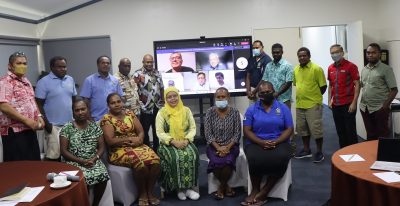Solomon Islands begin journey towards electric mobility
A multi-stakeholder validation workshop was successfully held Monday this week in Honiara on the Solomon Islands National Policy Roadmap for Electric Mobility.
The workshop gathered together representatives from the Government, private sector, NGOs and the academia.
More than 50% of the country’s GHG emissions comes from the energy sector from which transport sector contributes a huge portion of the total percentage.
The GHG emission from the transport sector have substantially increased over the years since year 2000 and therefore is a critical sector for Solomon Islands to achieve its climate mitigation and GHG reduction goals.
The government wants to reduce the emissions from the transport sector by promoting sustainable transport measures including promoting alternative vehicle technologies, including electric vehicles (EVs).
Solomon Island plans for rapid expansion towards renewable energy sources; thus it is also imperative that policies and enabling framework is created to allow for use of electricity produced from renewable energy sources in the transport sector.
This Climate Technology Centre Network (CTCN) being the implementation arm of the technology mechanism of the United Nations Framework Convention on Climate Change (UNFCCC) provided the technical assistance to the Solomon Island government to develop the policy framework for inclusive e-Mobility, a roadmap for inclusive e-Mobility and a market feasibility assessment for e-Buses.
The policy roadmap intends to guide the deployment and scale-up of electric vehicles for the country. It proposes a coordinated approach to improving affordability of electric vehicles, creating charging infrastructure, building skills and capacity and minimizing any environmental externalities.
The roadmap has been finalized through an in-depth and comprehensive review of the relevant policy measures, fiscal and non-fiscal, infrastructure challenges and extensive consultations with relevant stakeholders.
The stakeholder consultations included vehicle manufacturers and assemblers, transport operators and associations, users, institutions of Government, and academia, among others.
Generally, it is understood that different transport modes are critical catalysts for socio-economic development. Unfortunately, the carbon footprint of this crucial sector is huge, and without an urgent and coordinated approach, irreversible damage to the environment could occur.
Advancements in technology and other sustainable mobility systems have given hope to the new millennia. Electric mobility presents excellent opportunities for countries to leapfrog and promote clean development pathways.
The workshop heard that policy interventions are critical to the diffusion and scale-up of e‐mobility. Some of the important policy instruments to promote EVs include taxation and infrastructure measures in addition to financial incentives and subsidies for purchasing and supporting imports, local assembly and retrofitting, and private sector partnerships.
Participants also learned that implementing this Policy Roadmap will require a review of existing legislation and the introduction of new ones to ensure policy coherence and relevance combined with developing and implementing a communication strategy to create awareness and build public confidence in electric mobility.
It also requires the development of standards for electric vehicles and related charging infrastructure and components. These are pertinent issues that have been highlighted in the policy roadmap.
The Ministry of Mines, Energy and Rural Electrification will continue to work closely with the respective institutions and stakeholders to ensure policy coherence and implementation of the roadmap. As part of its green growth policy, the government wants to reduce emissions from the transport sector by promoting sustainable transport measures to transition into alternative vehicle technologies like electric vehicles (EVs).
The Policy Roadmap lays down the most relevant policies to create an enabling environment for electric vehicles in Solomon Islands and involved a robust stakeholder consultation process that was facilitated under the Chairmanship of Ministry of Mines, Energy and Rural Electrification.
-GCU


